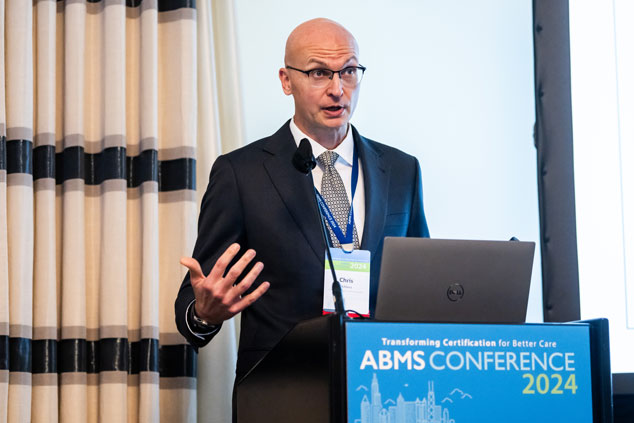
Kevin “Chris” McMains, MD, PhD
American Board of Otolaryngology–Head and Neck Surgery
Specialty: Otolaryngology—Head and Neck Surgery
Subspecialty: Rhinology
Certification: Sleep Medicine
Kevin “Chris” McMains, MD, PhD, embodies the spirit of service and scholarship. A physician, educator, and proud U.S. Army Reservist, Dr. McMains blends clinical excellence, academic inquiry, and patriotic commitment in a career that spans both military and civilian medicine. As a member of the 2022–2023 cohort of the American Board of Medical Specialties (ABMS) Visiting Scholars Program™, Dr. McMains deepened his impact by exploring how professional identity is shaped in the medical board examination world.
Currently serving as a professor in the Department of Surgery at Uniformed Services University of the Health Sciences (USU) in Bethesda, Maryland and working as a staff surgeon at the South Texas Veterans Health Care System in San Antonio, Dr. McMains has dedicated much of his career to developing medical educators and advancing surgical care. “I have the luxury of loving many aspects of my day job,” he said. “I am still very active clinically, teaching residents, with a significant role in faculty development, and I enjoy every bit of that variety, and I believe they complement and nourish one another.”
Dr. McMains chose the field of otolaryngology—more colloquially known as “ear, nose, and throat”—for its surgical rigor and unique intersection with the senses. “Otolaryngology actually interfaces with all five of the main named senses…that really appealed to me,” he said. His second certification, sleep medicine, reflects a further refinement of that focus. “Untreated sleep apnea is a growing epidemic in our country,” he noted. “Sleep disorders and the downstream health effects are things we need to be aware of and knowledgeable about.”
Sponsored by the American Board of Otolaryngology–Head and Neck Surgery (ABOHNS), his ABMS Visiting Scholars project, Professional Identity Formation and Otolaryngology–Head and Neck Surgery Oral Board Examinations, looked at how the format and experience of board certification influences physicians’ evolving sense of self. “The work I did was looking at the effects of different formats of delivery of board exams had on professional identity formation,” he explained.
Participation in the ABMS Visiting Scholars program offered both practical tools and professional validation. “The monthly check-ins with the cohort made me feel like I was part of that particular community in a meaningful way,” Dr. McMains recalled. That sense of belonging was complemented by tangible career advancements. “My project was sponsored by my certifying board, ABOHNS, and that gave me some extra visibility and opportunities to do valuable work with them. For example, I was able to present my progress to, and have meaningful discussions with, the Education Committee of the ABOHNS Board of Directors, which is the relevant committee around the type of work I was doing.”
That extra visibility likely aided his increased contribution to the development of multiple ABOHNS assessments, which are vital to the ABMS Member Board’s mission. “Several years ago, I volunteered as an ABOHNS item writer, which was a great experience,” said Dr. McMains. “Likely, as a result of the work I did for my doctorate and the ABMS Visiting Scholars project, I was elected to the ABOHNS Exam Council, which has been a very significant experience for me.”
Dr. McMains’s ABMS Visiting Scholars project also served as the basis for his successful thesis submission to the prestigious American Laryngological, Rhinological and Otological Society, Inc., also known as the “Triological Society.” His induction included participation in a follow-along panel that explored the connection between medical specialty, professional identity, and physician well-being.
The ABMS Visiting Scholars program also provided a platform for Dr. McMains to build on his long-standing research into professional identity formation, especially among medical educators. His scholarly contributions include co-authoring several influential studies such as The Making of an Educator: Professional Identity Formation Among Graduate Medical Education Faculty Through Situated Learning Theory and Controlled Burn: Managing the “Forest Fire” of Leaving a Professional Identity in Medical Education.
Dr. McMains continues to serve his country as an Army Reservist—a role that adds another dimension to his identity. To ensure that he is ready to serve his country at a moment’s notice, Dr. McMains participates in monthly military activities and spends an additional two weeks each year training. His military service, which he carries out alongside his civilian responsibilities, reflects a commitment to country and care that is inspiring.
His clinical work supports current and former military personnel as well, as he spends his clinical time seeing patients at the Audie L. Murphy Memorial Veterans’ Hospital and the Brooke Army Medical Center, both in San Antonio, Texas. He also serves as faculty at USU, which is the nation’s only federal health sciences university that educates, trains, and comprehensively prepares uniformed services health professionals, scientists, and leaders to support the military and public health systems.
While the ABMS Visiting Scholars program often draws early-career professionals, Dr. McMains humorously notes that he may have been an exception. “I don’t know if I have the distinction of being the oldest Visiting Scholar,” he joked. “It would be very charitable—or I would be living a very, very long life—if I’m considered early in my career.” Yet, the program has nevertheless served as a pivotal juncture in his professional journey, affirming that meaningful growth and leadership can happen at any stage. Dr. McMains is living proof that curiosity, compassion, and commitment can lead to lasting impact, whether through the operating room, the classroom, the research lab, or the battlefield.
-
Read More:
- ABMS Scholars |
- Member Boards |
- Research |
